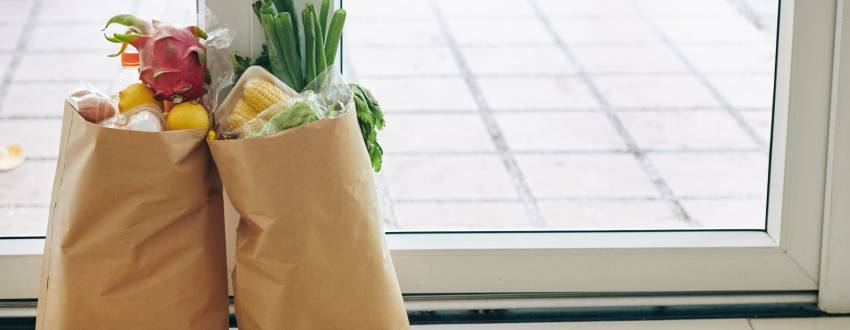By: Dena Don, RDN, CDN
Preparing for Yom Tov can be pricey, especially if you’re having guests over for meals. Today, when we’re seeing such high prices on groceries, it can really take some extra thought to prepare Yom Tov menus that are both thrifty and special. I gathered some guidance from several planning and budgeting professionals to help with this.
I had the pleasure of interviewing three talented women: Yael Wiesner is a professional organizer and interior designer based in Israel; Miriam Wartell is the founder of The Kosher Coupon Lady and the author of “I Don’t Have Time to Save Money,” and Rebekah Saltzman is the founder of Balagan Be Gone Personal Organization. Enjoy reading their expertise below!
NOTE: This interview has been lightly edited for grammar, length, and clarity.

DD: As you’ve probably noticed, groceries have gotten so expensive! Do you have any tips for how to save money while grocery shopping?
RS: The best way to save money while grocery shopping is to be prepared. Plan your menus and your lists in advance so that you know what and how much you need of each item. You will be less likely to over-buy or overspend when you plan in advance. It also reduces food waste, which is great!
MW: I’ve had numerous people mention to me how everything has gotten so much more expensive. What we have experienced with inflation has been a long time coming, but my tips for saving money haven’t changed. Despite the fact that prices have gone up, you can still learn how to get the best price available. As I wrote about in my book, “I Don’t Have Time To Save Money,” the brands we buy take turns promoting themselves with sales. It’s about taking advantage of those sales and stocking up at the lowest price instead of just as we need it. We want to be proactive with our shopping and not be stuck paying retail prices when we run out of something.
DD: Do you grocery shop online or in-person? Which is your preferred method and why? Which method would you recommend when shopping for Rosh Hashanah?
YW: Convenience is my preferred method. Do what is most convenient for you. I live across the street from a supermarket, so it’s easy to go shopping there. But if I didn’t, I would shop online. When you are calm, cool and collected, you make smarter shopping decisions.
RS: I like to pick out my own things so I shop in person, but often I supplement with ordered food. For example, I usually order my meat, but choose my produce.
MW: Prior to the pandemic, I was always at my local supermarket, which for me is ShopRite. I would check to see what’s on sale and plan my shopping accordingly. Since the pandemic, I have been doing a mix of pick-up orders, minimal in-store shopping, and using shopping apps like Instacart. I use Instacart because I can stack promotions like $10 or $20 off with free delivery trials.
DD: Many people say that buying in bulk can help save money. Is this the case for you? Why or why not?
YW: I don’t believe that buying in bulk necessarily saves you more money. If you have more soda, you drink more. If you have more snacks, you eat more. You can stock up on cooking ingredients like poultry, meat, and legumes because you won’t waste those items, but it’s only a “savings” if they are on sale.
RS: There is a difference between buying in bulk and buying from bulk. Buying in bulk, I find, can be tricky – you really have to know how much things cost at a variety of different stores in order to know if you are getting a good deal. However, buying from bulk, which I love to do, usually saves money, as the price per pound is less. This is when you buy from bins and put them in your own containers. At first, buying from bulk can seem cumbersome, but over time you will find that it really does save money and is better for the environment.
MW: I am personally not a fan of buying in bulk. The only thing that seems to make sense to buy in bulk are disposable items like plastic cutlery, aluminum pans, diapers (for anyone with little ones), etc. You also have to factor in cash-flow issues and the membership price for wholesale clubs. For some very large families it may make sense, but I wouldn’t recommend it for most people. Usually, you can also get free trial membership at wholesale clubs.
DD: What do you consider when planning your Rosh Hashanah menu? Do you have any menu planning tips that can help our readers save money?
YW: I try to make fewer types of foods when it comes to a two-or-three-day yuntif. For example, I’ll make two sides per meal instead of three or four. No one needs to eat so much – certainly not by the second day of yuntif…Also, even though I have a large family, I’ll prepare the cake, kugel, deli roll, etc. in a few smaller pans instead of in one large one and start with serving one or two pans. This way, if there are leftovers, they remain fresh and uncut in their own pan.
RS: You don’t need to reinvent every meal on Yom Tov. Make a menu plan and reuse it from year to year. This saves time and money. Oftentimes new recipes don’t work great on the first try or you need some extra time to get it just right… Of course, if you want to try new things, go ahead, but swapping out one salad for a different one is a lot different than doing it all from scratch!
MW: I don’t plan my menus around my shopping. I save money on things I buy every day so I can splurge on and enjoy what’s important to me. Meaning, if you take the next few weeks to save money on items like cereal, coffee, snacks, etc. you can take your savings and use it to get a catered meal.
DD: Do you have any recommendations for specific dishes that can feed a crowd that are budget-friendly? What are your go-to easy, budget friendly recipes?
YW: Any rice or pasta dish can be mixed with a meat or a vegetable – for example, you can make deli-rice, spaghetti salad, rice salad, etc.
RS: Rice with lentils (mejadra) is a great dish – you can season it in so many ways, it is an all-in-one dish, and perfect for most people. I also love making turkey. I find that it isn’t something you make all the time, and it feeds so many people. It is also fairly easy to make, and usually you can get a good deal on a frozen one.
MW: Anything with pasta will be one of the most budget-friendly (and easy to make) crowd-pleasers. I grew up with noodle kugel (made either sweet or savory), so that’s a holiday staple.
DD: What’s on your Rosh Hashanah menu this year? What does your family enjoy?
YW: Apple kugel, honey cookies, corned beef, schnitzel and pastrami roll-ups, deli roll… I save my experiments for Succos. I do a similar menu each year for each yuntif.
RS: Usually, we make brisket and spare ribs – those are a favorite. I only make them on Rosh Hashanah. I also make this carrot salad for the Simanim that everyone loves. I just julienne the carrots and mix them with salt, pepper, lime juice, loads of minced garlic and parsley! Yum!
DD: Do you have any easy swaps for ingredients that tend to be more expensive (ie, kosher cheeses, meats, nuts, etc.)?
RS: Nope – I look to cut costs in other areas!
MW: With foods like nuts, you can get a good price if you know where to shop. Walgreens usually has a very good sale on nuts a couple of times per month.
DD: What are some sneaky ways to save money on food which guests are unlikely to notice?
YW: Add breadcrumbs or matzo meal with some water to your chopped meat. Smaller dessert cups or smaller muffin holders will yield smaller portions and also help you save money.
RS: Buy food on sale and freeze it. Also, when something is starting to go bad in my fridge, like carrots, I just pop them in the freezer and use them for soups later on. When my bananas turn, I freeze them and then bake a cake. We don’t like to waste food.
MW: Beans are a very inexpensive and healthy option.
Editor’s Tip:
For expensive cuts of beef like ribs, serve them as an appetizer. Appetizers are smaller in portion size so there isn’t a need to buy as much. Since appetizer plates are also smaller in size, the amount of meat per plate won’t look as small.
DD: Is there anything else you’d like our readers to know? Do you have any other tips for budget-friendly eating or grocery shopping that you’d like to share?
YW: Buy the supermarket brand instead of the famous brand – it’s usually just as good! I must add that Hashem pays for all of your yuntif food, and you don’t need to be so worried about saving money with your yuntif menu. It’s on Him! It’s important to make foods that are easy to serve and clean up so that you can focus on your davening on Rosh Hashanah.
RS: Keeping track of how much you spend from year to year is important…I also find that you can use cheaper ingredients, like cabbage, in several ways. You can wash and prep the cabbage one time and then mix in different dressings. You’ll spend less money on the ingredients and less time making salads!
————
Dena Don, RDN, CDN, is a registered dietitian nutritionist and writer based in New York City. Dena is trained to help children, teens and adults with a variety of nutrition-related concerns, including weight loss, weight gain, eating disorders, IBS, pregnancy, diabetes, high cholesterol and others. She currently works within a practice that accepts most insurances. To see more of Dena’s work, check out her Instagram page @theartsypalate. Please email Dena at theartsypalate@gmail.com with any questions you may have or if you’re interested in working with her!








Reviews